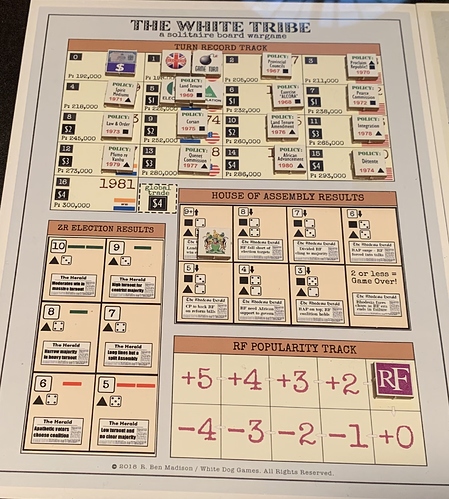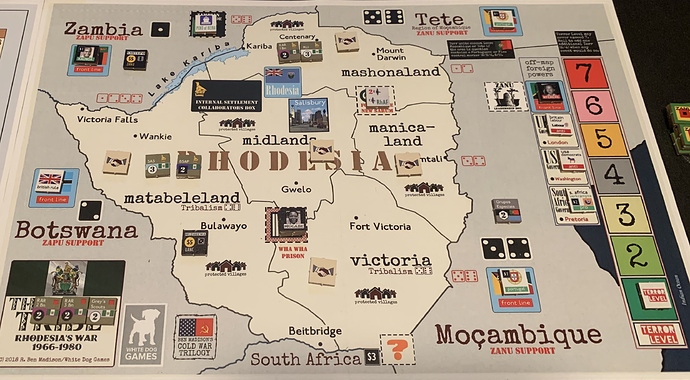Thought I’d play through a game of The White Tribe and record it on the forum.
For those of you who missed @Brooski’s post above, The White Tribe is game by R. Ben Madison, published by White Dog Games. It covers Rhodesia from 1966-1980, where the white-led government sought to come to terms with Rhodesia’s black majority, while resisting Soviet and Chinese backed rebel forces. To quote the back of the box copy:
In The White Tribe you are the Prime Minister of the illegal settler state of Rhodesia (today’s Zimbabwe), which broke from Britain in 1965. Your job … is to defeat a guerrilla war—and overcome the obstacles of party politics, tribal resentments, and racial extremism to stitch together a working coalition of population groups that can finally turn Rhodesia into a multi-racial democracy built on compromise. Can you thread the needle in building a new nation that protects the rights of all its people? Or will your new nation be overwhelmed by a Chinese-backed Marxist-Leninist guerrilla terrorist army that seeks to make the genocidal tyrant Robert Mugabe dictator-for-life?
Let’s see how I do!
Rhodesia, January 1966
Rhodesia awoke to a shock this morning as Prime Minister Ian Smith, leader of the Rhodesian Front and primary driving force behind Rhodesia’s Unilateral Declaration of Independence, was pronounced dead following an aneurysm. After a period of infighting among the Smith cabinet, dark horse candidate Charles Foster Kane was elevated to Prime Minister. Prime Minister Kane announced that he intends to work towards a multiracial government of Rhodesia, but that he will oppose the Soviet-backed Zimbabwe African People’s Union (ZAPU) and Chinese-backed Zimbabwe African National Union (ZANU).
In the last election, the Rhodesian Front, a party representing the interests of the white settler class, won all of the seats in the House of Assembly, guaranteeing their control over the government. As a result, conservative policies will be easy to pass, and liberal policies will be quite difficult.
Polling after Smith’s death shows that the Rhodesian Front is only mildly popular (+1 on the popularity track). However, elections will not be held until 1970 (Turn 5), so there is plenty of time for Prime Minister Kane to improve the government’s popularity—or drive it into the ground.
Rhodesia is stable in January 1966, as both ZANU and ZAPU are lacking in resources (Terror Track at 1). Race relations are generally positive (represented by the hand shake icons in each territory).
Rhodesia’s neighbors are also mostly stable. Botswana is under British rule, and will not tolerate ZAPU militants. The Zambian government, led by Prime Minister Kaunda, is generally supportive of Rhodesia, though ZAPU militants are organizing in their territory. Mozambique is currently ruled by Portugal, with a substantial investment in border security (ZANU militants may organize in Mozambique, but may not cross the border into Rhodesia as long as Portugal maintains control). Portugal also provides financial support for Rhodesia ($1 for each Portuguese control marker on the map, so $2 currently).
Rhodesia is not favored on the international scene, however. Both the British Labour Party and the United States Democratic Party oppose the Rhodesian Front. Prime Minister Nyerere in Tanzania likewise opposes Rhodesia’s white government. (None of these countries will provide funds for Rhodesia). Perpetual pariah and apartheid state South Africa supports the Rhodesian government. (South Africa provides $3 per turn, and an additional $2 because the current government supports Rhodesia).
Each turn in The White Tribe has six primary phases:
- The Rhodesia Herald Phase: Each turn, the player resolves random events effecting Rhodesia, its neighbors, and the international stage.
- The Politics Phase: Scheduled elections occur in South Africa, the United Kingdom, and Rhodesia; Botswana contemplates independence; and, if Portugal has withdrawn and the right wing FICO movement has seized power, the player rolls to see if FICO collapses.
- The Commercial Phase: The player earns income from the income schedule (which provides for income from international trade, taxes on the population, and support from abroad) and may attempt to evade international sanctions. The player has a number of options, including: paying to prevent a collapse of morale in a region occupied by a ZANU or ZAPU unit (“Terr”); putting pressure on Zambia to eliminate ZAPU forces in its borders; spending to improve the popularity of the Rhodesian Front; spending to refuel and rearm the Rhodesian Air Force; attempting to entice resistance leaders to collaborate with the regime; and compromising with left-wing parties, which reduces the Rhodesian Front’s popularity, but makes it easier to pass liberal bills in the assembly.
- The Policy Review Phase: Where the player must either pass the current Turn’s policy or accept the negative effects from inaction. The player may also choose to resurrect a policy that was not acted on in a previous turn, or exercise visionary leadership to attempt to enact a policy from a future turn. Policies must be put to the assembly, and can fail, resulting in a collapse of the government and an immediate new Rhodesian election.
- Chimurenga Phase: In the Chimurenga phase, the player raises “Troopies” (the Rhodesian nickname for their soldiers) and sends them to territories in Rhodesia, or in more risky cross-border raids. After that the player determines where Terrs deploy (in numbers based on the terror track). The Terrs then move into Rhodesia, and combat occurs.
- Cosmopolitics Phase: Scheduled US midterm or presidential elections occur; ZANU or ZAPU Terrs remaining on the map terrorize the populace; and certain policies take effect.
In order to win, the player must succeed where Ian Smith and the Rhodesian Front failed, and create a viable multiracial state. Points are scored for race relations (handshake markers), RF popularity, Population growth, certain politically sensitive units being deployed, election results, certain policies, and having collaborators. You add a single die roll to the total, and then subtract the number of Terrs in Rhodesia. 23 or more points nets you a victory.
Now that we’ve covered setup, turn one will follow.

